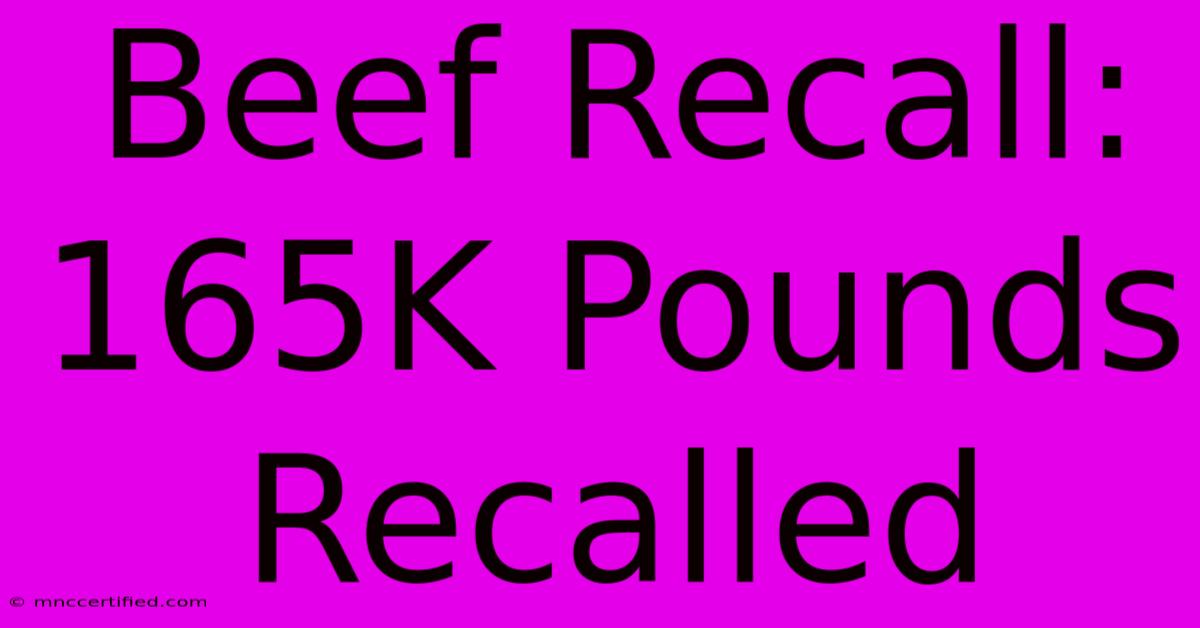Beef Recall: 165K Pounds Recalled

Table of Contents
Beef Recall: 165,000 Pounds Recalled Due to E. coli Contamination
A significant beef recall impacting 165,000 pounds of product has been issued due to potential E. coli contamination. This article details the recall, affected products, safety precautions, and what consumers should do.
Understanding the Beef Recall
The United States Department of Agriculture's Food Safety and Inspection Service (USDA-FSIS) announced a major recall of ground beef products due to potential contamination with Escherichia coli (E. coli) O157:H7. This dangerous strain of bacteria can cause severe food poisoning, leading to symptoms like diarrhea (often bloody), vomiting, and stomach cramps. In severe cases, it can lead to hemolytic uremic syndrome (HUS), a type of kidney failure, particularly dangerous for children and the elderly.
Key Details of the Recall:
- Amount Recalled: 165,000 pounds of ground beef.
- Reason for Recall: Potential contamination with E. coli O157:H7.
- Issuing Company: [Insert Name of Company Here – This information is crucial and needs to be added. The article cannot be complete without it.] – Include a link to their official website if available.
- Date of Recall: [Insert Date of Recall Here] – This is also essential information.
- Establishment Number: [Insert Establishment Number Here] – This number is vital for identifying the affected products.
Identifying Recalled Products
It's crucial to carefully check your refrigerator for any potentially affected ground beef products. The USDA-FSIS typically provides a detailed list of recalled products, including:
- Product Name: [List product names here. This section requires specific information from the official recall notice.]
- Packaging Details: [Include details like package size, best-by dates, and any identifying marks. This is critical for identification.]
- Establishment Number: [Reiterate the establishment number for easy reference.]
How to Identify Recalled Products: Consumers should look for the establishment number on the product label. If the number matches the number issued in the recall notice, immediately discard the product. Do not consume it.
What to Do if You Have Recalled Beef
If you have purchased any of the recalled ground beef products, do not consume them. Instead:
- Discard the product immediately. Place it in a sealed bag and dispose of it in the trash.
- Thoroughly clean any surfaces that came into contact with the raw beef. Use hot, soapy water to sanitize your counters, cutting boards, and utensils.
- Wash your hands thoroughly with soap and water for at least 20 seconds.
- Monitor your health. If you or anyone in your household experiences symptoms of E. coli infection, seek medical attention immediately.
Preventing E. coli Contamination
This recall serves as a stark reminder of the importance of food safety practices. Here are some tips to minimize the risk of E. coli contamination:
- Cook ground beef to an internal temperature of 160°F (71°C). Use a food thermometer to ensure it's thoroughly cooked.
- Wash your hands before and after handling raw meat.
- Keep raw meat separate from other foods to avoid cross-contamination.
- Clean and sanitize all surfaces that come into contact with raw meat.
Staying Informed about Food Recalls
Staying updated on food recalls is essential for protecting your family's health. Here's how to stay informed:
- Monitor the USDA-FSIS website: Regularly check their website for the latest recall announcements.
- Sign up for recall alerts: Many food companies offer email alerts for recalls.
- Follow reputable news sources: Keep an eye on news outlets for updates on food safety issues.
This recall highlights the importance of vigilance and proper food handling techniques. By following these guidelines, you can significantly reduce your risk of foodborne illnesses. Remember to always check for recall notices and prioritize food safety.
Keywords: Beef recall, E. coli, food recall, food safety, USDA, FSIS, ground beef, food poisoning, contamination, recall notice, foodborne illness, hemolytic uremic syndrome (HUS), food safety tips, food safety practices.
(Note: This article requires specific details from the official recall notice to be complete. Please fill in the bracketed information with the relevant details from the USDA-FSIS announcement.)

Thank you for visiting our website wich cover about Beef Recall: 165K Pounds Recalled. We hope the information provided has been useful to you. Feel free to contact us if you have any questions or need further assistance. See you next time and dont miss to bookmark.
Featured Posts
-
Is Aerolase Covered By Insurance
Nov 22, 2024
-
Cancel Insurance Policy Template
Nov 22, 2024
-
Mike Mcdonald Fisher Investments
Nov 22, 2024
-
A Man On The Inside Ted Dansons Performance
Nov 22, 2024
-
Transport Scotland Storm Bert Amber Alert
Nov 22, 2024